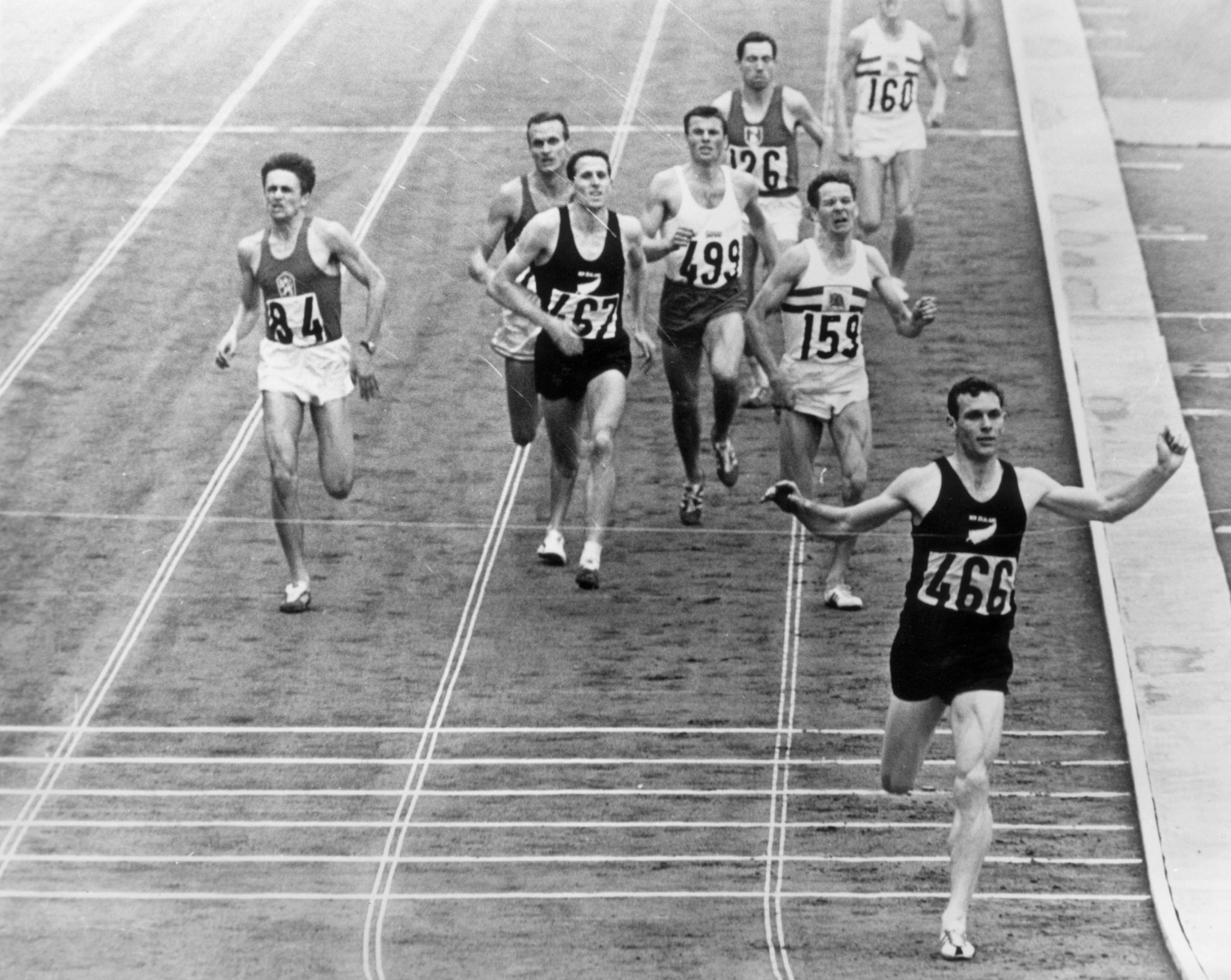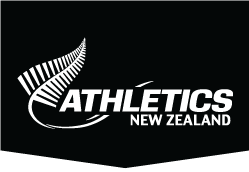News & Updates
New Zealand's top Olympic athletics moments

December 1964: New Zealander Peter Snell winning the gold medal in the 1,500 metres at the Tokyo Olympic Games held at the National Stadium. He also won the 800 metres. (Photo by Central Press/Getty Images)
Sir Peter Snell winning gold in the 1500m at the 1964 Olympic Games in Tokyo (Photo: Getty Images)
This year New Zealand toasted 100 years of Olympic Games competition as an independent nation. To further celebrate the centenary, we focus on 20 outstanding Olympic moments, starting with the first ten magic memories from 1924 to 1964.
1 – Sir Arthur Porritt
One of the most iconic names in New Zealand track and field, Sir Arthur made history at the 1924 Paris Olympics by winning 100m bronze to become New Zealand’s first ever Olympic track and field medallist and only sprint medallist. (Note: Taranaki-born Harry Kerr won 3500m race walk gold at the 1908 London Olympics but was representing a joint Australia/New Zealand team).
Born in Whanganui in 1900, the Kiwi edged a tight battle for bronze in 10.9 to finish behind Great Britain’s Olympic gold medallist, Harald Abrahams in the ‘Chariots of Fire’ final.
Sir Arthur went on to enjoy a distinguished career away from athletics. He enjoyed a five-year term as Governor General of New Zealand and served as surgeon to the British Royal Family. Hamilton’s Porritt Stadium is named in his honour while the annual Porritt Classic at the track remains one of New Zealand’s most prominent athletics meets.
2 – Jack Lovelock
The pioneering New Zealand middle-distance superstar produced a tactical masterpiece to secure 1500m gold at the 1936 Berlin Olympics.
Born in Crushington near Reefton on the West Coast, Lovelock was among the fancied contenders for gold in Berlin after setting a world one-mile record, striking Commonwealth mile gold and winning ‘The Mile of the Century’ in Princeton in the preceding three years.
A former Rhodes Scholar at Oxford University and medical student, Lovelock adopted a scientific approach to training and was very keen to understand how long he could sustain a final sprint. Using his extensive knowledge, Jack executed this tactic to perfection in the final. Moving into second with 300m to go, he briefly paused before picking up his cadence to surge to the front. He opened up a five-yard lead on the rest of the field and could not be caught, stopping the clock in a world-record time of 3:47.8.
3 – John “Dutch” Holland
Maybe not the most well-known of New Zealand’s 19 athletics medallists, but his magnificent 400m hurdles bronze medal at the 1952 Helsinki Games should not be undervalued.
The 440 yards hurdles silver medallist at the 1950 British Empire Games in Auckland, he arrived in Helsinki for his second Olympic appearance in outstanding shape.
There the 11-time national hurdles champion won his heat and quarter-final and then placed second in the semi-final before winning bronze in a time of 52.26 on a heavy rain-soaked track.
4 – Dame Yvette Corlett (nee Williams)
Trailblazing Yvette Williams became New Zealand’s first female Olympic gold medallist with a thrilling victory in the long jump at the 1952 Helsinki Olympics.
An outstanding all-round sporting talent, Yvette also excelled in basketball and netball. During a long and successful career, she collected 21 national titles in five events – shot put, discus, javelin, 80m hurdles and long jump.
But it was the latter event in which she excelled, winning the Commonwealth long jump title in Auckland in 1950.
In Helsinki, she fouled her first two attempts in the final and it was only a 5.90m effort in round three which enabled her to qualify for three more jumps.
In round four, she soared out to an Olympic record mark of 6.24m to secure gold by a 10cm margin. Two years later, she further cemented her legacy by adding 4cm to this mark to set a world record in Gisborne.
5 – Norman Read
Norman Read may have been born and raised in England but his greatest success came in the Black Singlet as he romped to 50km race walk gold at the 1956 Melbourne Olympics.
Possessing immense endurance, Norman was well suited to the 50km distance and, after emigrating to New Zealand in his early twenties, he was hurriedly added to the Olympic team for Melbourne after winning the Australian Championships.
On the day of the 50km, he got lost in the stadium corridors and only found his way to the track when the other walkers were already on the start line.
Producing a patient race, he caught and passed the long-time leader Yevgeny Maskinskov at 42km and went on to strike gold by more than a two-minute margin.
His performance earned him New Zealand Sportsman of the Year.
6 – Sir Peter Snell
Sir Peter Snell caused a sensation at the 1960 Rome Olympics to take an unexpected gold in the men’s 800m.
Born in Opunake but based in Auckland, Sir Peter took up athletics in his late teens but it was only after he started to work under the high-mileage training programme of legendary coach Arthur Lydiard did the Kiwi begin to make real progress.
He arrived in Rome ranked only 26th in the world but after winning his first round heat his confidence started to build. Making his way into the six-man final, he launched his winning attack in the final 100m.
Making a dramatic late move, he passed world record-holder Roger Moens on the inside in the final strides to strike gold in an Olympic record 1:46.3.
7 – Sir Murray Halberg
In the next race on the schedule after Sir Peter Snell lit up the Rome Olympics with his 800m success, another Arthur Lydiard-coached Kiwi, Sir Murray Halberg, outsmarted the opposition to strike gold in the 5000m.
At the age of 17, Halberg suffered a badly withered arm and shoulder in a rugby match but, after re-learning how to walk, run and dress himself, he discovered running as an outlet for his highly-competitive nature.
After winning the three-mile Commonwealth title at the 1958 Cardiff Games, the Aucklander adopted the same bold approach in Rome.
In the crucible of the Olympic 5000m final with three laps to go, he accelerated into the lead and opened up a 25m advantage. On the final lap, his lead was steadily eroded by Hans Grodotzki but an exhausted Sir Murray held on to win gold in 13:43.4, crossing the line just over a second clear of his German rival.
8 – Barry Magee
Another one of ‘Arthur’s Boys’ to claim precious metal at the 1960 Rome Olympics, Barry’s feat to win marathon bronze should not be underestimated.
Describing meeting Arthur as ‘the best thing that ever happened to me’, he found his natural strength and endurance was a great fit for the marathon.
After finishing second at the 1960 New Zealand Marathon Championships to earn selection for Rome, the race went to perfection for the Auckland grocer.
Going through the first half of the race conservatively, Barry started to make a real impact in the second half and moved into bronze at 32km.
Barry held on this spot to earn a podium place in 2:17:18.2 to finish behind Abebe Bikila, the barefoot Ethiopian who claimed the first Olympic gold medal by a black African.
9 – Marise Chamberlain
The pioneering Cantabrian helped usher in a new era for female endurance thanks to a brilliant 800m bronze won at the 1964 Tokyo Olympics.
Coached by the no-nonsense Latvian-born Valdy Briedis, her breakthrough arrived in the latter half of the 1950s when women were allowed to race for the first time in distances above 200m.
Setting the world 440 yards record in Christchurch, she later found a fondness for the two-lap distance, winning Commonwealth 880 yards silver at the 1962 Perth Games.
At the Tokyo Olympics, she performed with pride to take a memorable bronze medal. Responding to the crowd shouts of ‘black, black, black’ for Marise in the black singlet, she responded by accelerating around the final bend to take a podium spot in 2:02.8 behind Ann Packer of Great Britain.
Marise remains to this day New Zealand’s only female Olympic medallist on the track.
10 – Sir Peter Snell
Last achieved by Great Britain’s Albert Hill at the 1920 Antwerp Olympics, Sir Peter Snell cemented his legacy with an emphatic 800m/1500m double to confirm his place as the greatest middle-distance runner of his generation.
Since his shock 800m victory at the Rome Olympics, Sir Peter had developed into a global superstar, setting world records for the 800m, 1000m and mile.
In Tokyo, the Kiwi great took on the daunting challenge of six races across eight days with ease. Over the two-lap distance, he trounced the opposition to strike gold in an Olympic record time of 1:45.1.
Then in the 1500m he was, arguably, even more dominant, powering clear of the opposition to win by 1.5 seconds in a time of 3:38.1. During a golden period for New Zealand endurance running, Kiwi John Davies further bolstered the country’s formidable reputation by winning 1500m bronze in 3:39.6.
To learn more about New Zealand’s rich athletics history and legacy, please visit the Legends section of the Athletics NZ website.
LATEST NEWS
- Weekly Round Up: 1 July
- New Zealand middle-distance champion embraces coaching link up with rising star
- Weekly Round Up: 24 June
- Five further athletes added to World U20 team
- Maunder’s reflect on life of athletics service
- Weekly Round Up: 17 June
- Entries open for groundbreaking 2024 Mission Estate New Zealand Cross Country Championships
